From November 2nd to 3rd, 2019, the 16th Beijing Forum on “The Harmony of Civilizations and Prosperity For All—The Changing World and the Future of Humankind” was successfully held. The 9th sub-forum hosted by the National School of Development (NSD) at Peking University on “China’s Economic Development in Global Reconstruction” specially invited many influential economic and management scholars from various countries, who were divided into two groups, A and B, to conduct discussions. The sub-forum held sessions on the 2nd floor of Wanzhong Building of Langrun Garden at the NSD and at the lobby of Peking University Education Foundation, respectively.
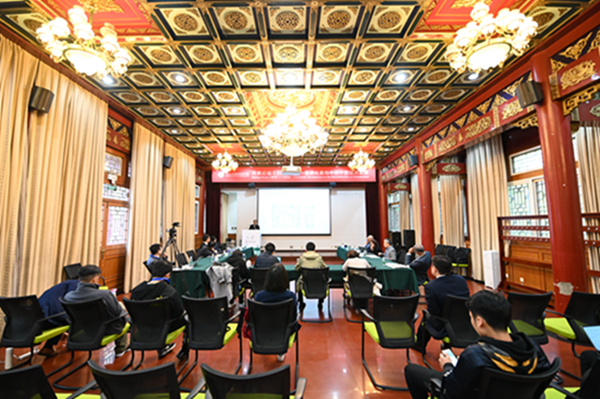
In the context of the current lull in the world economy, the Chinese economy has become the engine of global economic growth, and at the same time faces the opportunities and challenges in the process of transformation and upgrade. In this sub-forum, the relationship between the Chinese economy and the global economy was explored from the perspectives of trade, finance, financial management, currency, industrial development, healthcare, and welfare enhancement. The sub-forum was aimed at enhancing the understanding of global economic development by academic and industry circles, as well as providing reference for policymakers.
On November 2nd, at the seminar of Group A held at Langrun Park of the NSD, YAO Yang, Dean of the NSD and Boya Distinguished Professor at Peking University, and Changjiang Scholar Distinguished Professor of the Ministry of Education, first opened the session by welcoming the arrival of experts and scholars from around the world on behalf of the NSD. Next, Professor YAO spoke on the topic of “Fairness on the Border—A Way to Resolve China–US Trade Frictions,” introducing his recent joint statement with multiple well-known scholars of China and the United States entitled, “US–China Trade Relations—A Way Forward,” analyzing the current situation of China–US relations, and proposing new ideas for resolving trade frictions between the two countries, as well as the new role China should play in the global economic and trade system.
Professor Satoshi Mizobata of Kyoto University, Japan, spoke on the topic of “Government-led Imbalances in Innovation and Adaptation—Evidence from Russia,” analyzing the historical evolution of Russia’s innovation policy and the reasons for its failure, noting that high-quality government leadership and educational standards are critical for improving a country’s innovation capabilities.
Professor LIU Guoen, Boya Distinguished Professor at Peking University, Changjiang Scholar Distinguished Professor of the Ministry of Education, and Director of PKU China Center for Health Economic Research (CCHER), spoke on the topic, “The Role of Inclusive Growth and Health,” analyzing China’s economic structure and sectoral characteristics in recent years, as well as the current situation in which medical treatment and healthcare are rising to middle-to-high levels in the consumption structure. He noted that human health is the common value of the world that can connect civilizations, reduce conflict, and restore harmony.
Professor WU Yanrui of the University of Western Australia analyzed the data of 230 Chinese county-level cities and found that cultural diversity was negatively correlated with the city’s foreign investment attractiveness.

Professor LEI Xiaoyan, Professor of Economics at the NSD, Changjiang Young Scholar, and Director of PKU Center for Healthy Aging and Development Studies, spoke on the topic of “Aging in China—Trends, Challenges, and Opportunities,” outlining the five major challenges in the future of China’s demographic structure and providing policy recommendations targeted at these challenges, which include relaxing family planning and encouraging fertility, making full use of “demographic dividends” and raising the standards of human capital, improving medical treatment and healthcare standards, improving pension systems and establishing a more flexible retirement mechanism, and developing long-term care services.
In the afternoon session, Professor CHEN Chunhua, “K.C.Wong Chair Professor” of Peking University, and Dean of NSD’s MBA program, BiMBA, spoke on the topic of “Digital Ways of Living—Symbiosis and Growth.” Professor CHEN believes that the biggest problem for enterprises currently is how to better respond to and develop within the digital era. Her proposals include shifting the management strategy from the logic of competition to the logic of symbiosis, allowing organizational management to move from “division” to “integration,” and creating a “symbiotic organization” to form a synergetic effect.
Professor LI Shi from Zhejiang University summarized the evolution of income inequality in China since the 1980s, and analyzed the reasons for the changes using detailed data.
Mr. GUO Zhouming, Director of the China Commerce and Trade Press, introduced what he believed should be the contents encompassed within China’s “high-quality” open economic development, and noted that the key task of moving from “speed” to “quality” was to adhere to global free trade order and actively promote a new round of high-quality opening-up.
Professor HUANG Yiping, “Jinguang Chair Professor” and Deputy Dean of the NSD, spoke on the topic of “China’s Dual-Pillar Macro Policy Framework.” He noted that China is the largest emerging-market country and also a transitioning country, thus China’s monetary policy has its own specific features. Beginning from 2019, the People’s Bank of China set up a macro-prudential management department, combining it the monetary policy to form China’s dual-pillar macro policy. He suggested that a flexible combination or independent use of the monetary and macro-prudential (financial stability) policies can increase the effectiveness of the policies.
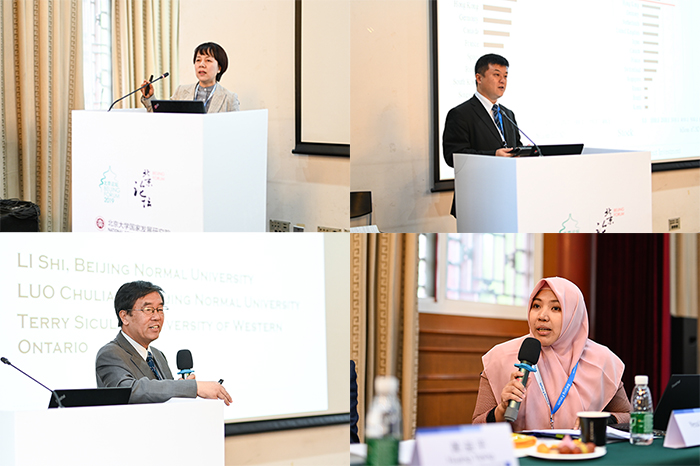
WANG Xiaohong, Deputy Director of the Information Department of the China Center for International Economic Exchanges (CCIEE), noted the six aspects in which China needs to expand the opening up of the service industry, in the speech titled “Thinking on Expanding the Opening up of the Service Industry during the 14th Five-Year Plan Period”.
Yessi Vadila from the Ministry of Trade, Republic of Indonesia, spoke on the topic, “The Impact of China-US Trade Frictions on Indonesian Trade and Investment.” She believes that the current China-US trade tensions will bring about short-term development opportunities to Indonesia, but in the long run, as global demand and investment decline, it will ultimately be harmful.
On the same day, at the seminar of Group B held at the “Friends of Peking University” Lobby of Peking University Education Foundation, the session opened with a welcome speech given on behalf of the NSD by Professor YU Miaojie, Boya Distinguished Professor at Peking University, Changjiang Scholar Distinguished Professor of the Ministry of Education, and Party Secretary of the NSD.
Professor Daniel Trefler of the University of Toronto spoke on the topic of the “Current Situation and Countermeasures of the World Trade Organization.” He analyzed the problems of China-US trade frictions and the impact of these problems on the World Trade Organization (WTO), proposing to increase communication among various parties and increase efforts in resolving trade disputes.

Professor QIU Dongxiao of the University of Hong Kong spoke on the impact of imports on productivity from the perspectives of type, quantity, price, and technology.
Professor Deborah Swenson of the University of California, Davis, spoke on the topic of the “Impact of Policy Uncertainty—on the Levels of Trade and Supply Chain,” measuring the impact of policy uncertainty on the global value chain through the impact of bilateral investment agreements on value-added trade.
Professor Sai Ding of the University of Glasgow spoke on the phenomenon of Chinese banks expanding actively outside of the country in recent years, analyzing the motivations and strategies behind the internationalization of Chinese banks, and discussing the possible policy- and market-related reasons.
Professor YU Miaojie of the NSD spoke on the topic of the “Miracle of China’s Foreign Trade—Historical Performance, Driving Forces and Challenges,” centering the discussion around the three aspects of China’s history of opening up, the main driving forces behind China’s foreign trade growth, and the main challenges currently faced by China. He recommended the implementation of an import-oriented development strategy, promotion of regional trade agreements and acceleration of technological R&D, in order to create new comparative advantages.
Professor LI Zhiyuan of Fudan University analyzed the impact of trade liberalization on the deviation of the domestic one-price law. This research made up for the deficiency of the two explanations for the one-price law, that is, trade costs arising originally from the division of commodity market regions, and nominal price stickiness.
Professor HONG Junjie of the University of International Business and Economics spoke on the topic of “How and Under What Circumstances Do Organizations Work? —Impact of Government Policies on the Internationalization of Chinese Multinational Corporations.” He proposed that it is necessary to focus on the cultivation of R&D and innovation capabilities, emphasize functional industry policies, maintain fair competition within the industry, and focus on long-term goals, in order to improve industry policies.
Professor Tibor Besedes of the Georgia Institute of Technology analyzed the relationship between trade liberalization and women’s benefits, suggesting that the reduction of gender gaps in various dimensions may lead to different changes in women’s benefits.
Professor ZHAO Laixun of Kobe University, Japan, analyzed the various reasons why China became a target country for anti-dumping.
Professor LIU Qing of the Renmin University of China spoke on the topic of “Trade Policy Uncertainty and Innovation—Evidence from China,” verifying that trade liberalization can reduce market uncertainty and lead to greater market innovation.
Professor LI Guangzhong of Sun Yat-sen University noted in his speech, “Geopolitical Risks, Corporate Assets and Liabilities, and Corporate Investment—International Experience”, that a country can neutralize the impact of geopolitical risks by strengthening its corporate balance sheets.
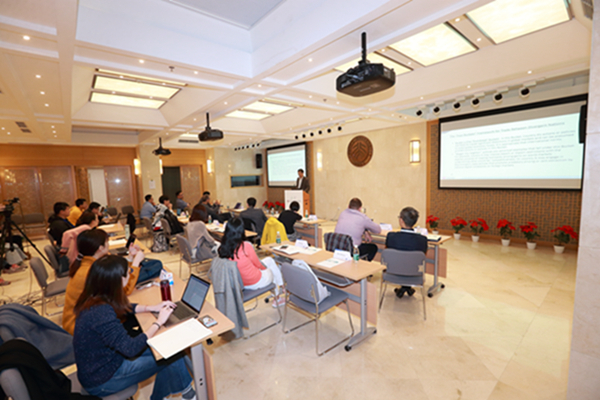
In the seminar of Group A held at Langrun Garden on November 3rd, Professor ZHANG Fan of the NSD opened the session with a welcome speech and spoke on the topic of “Impact of the High-Tech Industry on China’s Economic Structural Changes.”
Takuma Kobayashi, Associate Professor of Matsuyama University, Japan, analyzed the impact of China’s external investment on the domestic problems of the Belt and Road countries.
Professor LI Changying of Shandong University used the data of 29 provinces and cities between 1998 and 2017 to analyze the historical evolution and regional characteristics of China’s new and old kinetic energy conversion, and proposed policy recommendations.
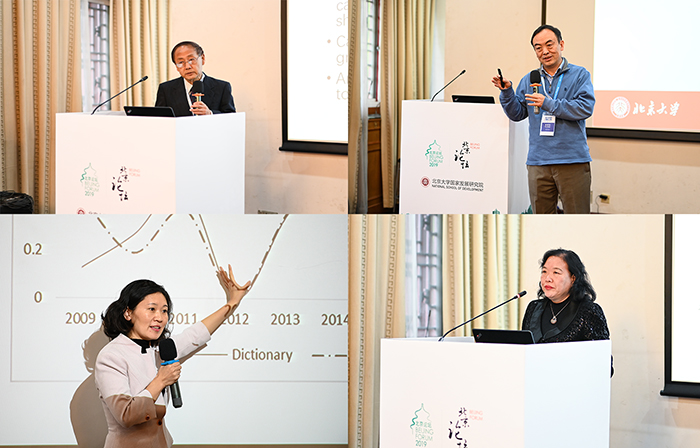
Professor XU Jintao, Boya Distinguished Professor at Peking University and Deputy Dean of the NSD, spoke on the topic of “Trade Liberalization and Environmental Changes—A Re-analysis of China’s Economic Growth Model.” He believes that high-speed development should be shifted to normal development in the future, and that it is necessary to correct the distortion of factor pricing, introduce environmental and carbon taxes, and improve overall factor productivity.
Haroon Sharif, Chairman of the Pakistan Board of Investment, described the situation of industry cooperation in the China–Pakistan Economic Corridor. He noted that China-Pakistan economic cooperation should adhere to a people-oriented principle, and that it is necessary to provide policy and financial support through various measures, such as strengthening infrastructure construction, driving agricultural development and public-private partnerships, establishing a knowledge and capacity development fund, and developing local financial markets.
Researcher GUO Xiumei of Curtin University, Australia, introduced her research on the overseas travel trends of Chinese tourists to Southeast Asian countries and Australia, as well as the benefit of the Belt and Road Initiative to the Australian tourism sector.
Professor SHEN Yan of the NSD spoke on the topic of “Industry Policy Relevance and Performance of Listed Companies—Effectiveness Evaluation and Internal Mechanisms,” analyzing the relationship between the listed company’s attention to and participation in government policies and the company performance.
On November 3rd, at the seminar of Group B held at the “Friends of Peking University” Lobby of Peking University Education Foundation, Professor SHENG Liugang of the Chinese University of Hong Kong empirically studied the impact of the Belt and Road policy on the economic activities of China and countries along the route.
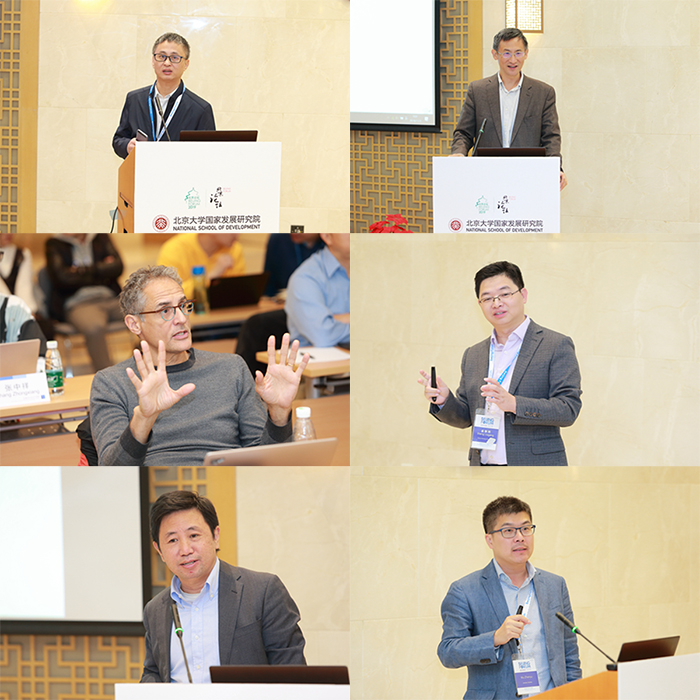
Professor JU Jiandong of Tsinghua University spoke on the topic of “China-US Trade Dispute and Global Reconstruction,” and proposed that a third option exists in between “integration” and “decoupling” for China–US relations, that will allow countries to independently design a series of industry policies, technical systems, and social standards, as well as protect industries and technologies using targeted policies without placing additional burdens on foreign countries.
Professor LI Han of the Southwestern University of Finance and Economics used a simulated natural experiment and the difference in differences (DID) method to study the relationship between high-speed railways and labor productivity.
Professor LI Kunwang of Nankai University discussed the impact of opening up on China’s intergenerational career mobility. He noted that the increase in degree of trade openness significantly promoted intergenerational career mobility, and that there is a distinct trend in which the occupational status of the younger generation is lower than that of the older generation.
Professor WANG Hao of the NSD spoke on the topic of “Competition, Cooperation, and Economic Development,” outlining the two kinds of economic relations of competition and cooperation, as well as the impact of government intervention, noting that the government should play the role of a collaborator as opposed to a referee.
Professor GE Suqin of the Virginia Polytechnic Institute and State University, US, spoke on the topic of “Economic Assimilation from Rural China to Urban Immigrants,” analyzing the phenomenon of the large-scale labor movement that began in China in the 1980s and its effects of driving the Chinese economy.
Professor Zhenyu Wu of the University of Manitoba, Canada, outlined and analyzed a series of questions related to family businesses.
Professor ZHANG Zhongxiang of Tianjin University spoke on the topic of “International Trade and Climate Change—Focusing on Carbon Leakage, Industrial Division of Labor, and Impact on China,” analyzing the main causes of carbon leakage and China’s role in it.
During the discussion segment after the main speeches, the participating scholars exchanged views at depth on the various issues presented. The sub-forum concluded smoothly amid a warm and friendly atmosphere.
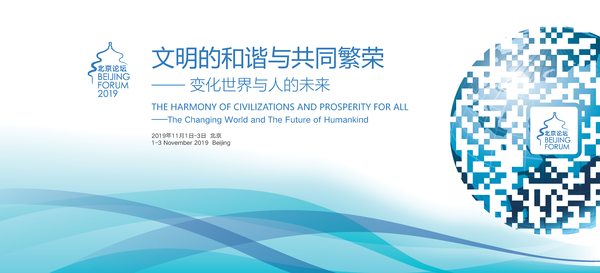
About Beijing Forum
The Beijing Forum is an international academic conference jointly sponsored by Peking University, the Beijing Municipal Commission of Education, and the Korea Foundation for Advanced Studies. It is approved by the Ministry of Education of the People’s Republic of China, and guided and supported by the People’s Government of Beijing City. The Beijing Forum was founded in 2004 and is held once a year. It has been held for 15 consecutive years. More than 5,300 distinguished office-holders and well-known scholars from over 70 countries and regions around the world have participated in the academic conference.
The 2019 Beijing Forum is centered around the overall theme of “The Harmony of Civilizations and Prosperity For All.” On the basis of Beijing’s rich cultural heritage, it is committed to promoting research on issues in the humanities and social sciences around the world, promoting world academic development and social progress, and contributing to the development of the human race. The forum believes that the convergence of different civilizations in a peaceful environment has always been a source of motivation and fundamental safeguard for the progress of human society.
The Beijing Forum lasted over the course of three days and commenced with a grand opening at the Diaoyutai State Guesthouse on November 1st, 2019. A total of 13 sub-forums and 3 panel discussions were held. The forum revolved around three broad themes, “Diversity and Civilization,” “Changing the World,” and “Future of Humankind. The themes of the 13 sub-forums included “Governance and Civilization—the Origin of Nations in Different Systems of Civilizations,” “Language, Culture, and Identity in the Intersections of Diverse Civilizations,” “Civil Interactions from the Perspective of Global History,” “Gifts and Exchanges—the Spread of Chinese Civilization,” “Writing Practice in Early Civilization—Origins, Formation, and Integration,” “Pulse of the World— Silk Road Archaeology and Ancient Civilization,” “Women’s Power and Development in the Process of Civilization,” “World Order in the Process of Change,” “China’s Economic Development in Global Reconstruction,” “Science, Health, and Society from the Perspective of Scientific Culture,” “Environmental Health,” “Humanity and the Rule of Law in the Digital Age,” and “General Education in Colleges and Institutions—International Experience and Exploring Asia.” In addition, the forum also held three panel discussions centered around the themes of “New Perspectives on General African History and African Studies,” “China–Africa University-Level Scientific and Technological Innovation and the Transformation of Scientific and Technological Achievements,” and “Confluence of the Arts and the Environment.” Among them, the sub-forums on “Pulse of the World—Silk Road Archaeology and Ancient Civilization” and “Women’s Power and Development in the Process of Civilization” are new and pioneering themes established by the Beijing Forum this year. In addition, the forum also focused on hotspot issues including environmental health, humanities and science and technology, technology ethics, and women’s studies.